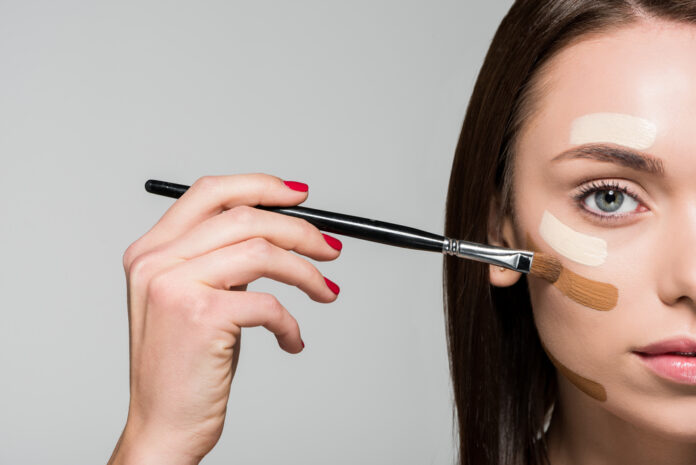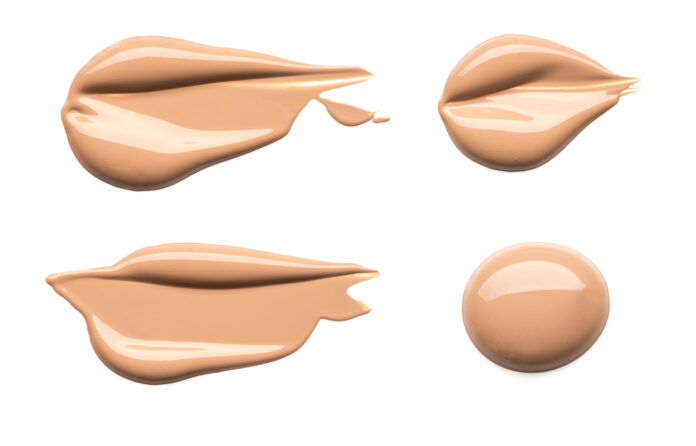Both concealer and foundation can help you achieve smooth, glowing skin and cover up any imperfections. However, they have different uses and applications.
Can you use both foundation and concealer? What are the benefits of both? When should you use each one in your makeup routine? Here is everything that you need to know about these two products.
What Is Foundation?
Foundation is a makeup product that helps create an even base for the rest of your look and smooth out any skin imperfections.
Foundation can come in a few different formulas. Liquid formulas come in bottles or tubes, as do cream formulas, which are a little thicker. For those that want lighter coverage and less grease, there are powder formulas. Besides traditional foundations, there are also water-based and serum varieties. You can also choose from different coverage strengths and finishes.
All foundation is applied to the whole face regardless of application type. That helps create a uniform skin tone and texture.
What Is Concealer?
Concealer is another type of makeup product used on the skin. Concealer is makeup designed specifically to cover up blemishes such as acne, dark circles, and age spots.
As with foundation, concealer also comes in different application types. You can get liquid, stick, or cream concealer. Some concealers also have color-correcting formulas tailored to covering up specific kinds of blemishes. For example, green-based concealers can cover up redness, whether it’s acne or another skin condition.
The Differences Between Foundation and Concealer
One of the biggest differences between foundation and concealer is the application process. The foundation needs to be applied to the whole face to achieve a uniform skin tone and texture. However, concealer should only be applied to problem areas on the face, such as pimples or undereye circles.
Part of the reason concealers can conceal blemishes so well is their formula, which is another major difference between it and foundation. Concealers tend to be thicker than foundation, which means that they offer more coverage (although no concealer will be able to cover up blemishes completely while preserving a natural look). The thicker formula is also why concealer should be used sparingly instead of across the whole face as you would foundation.
However, one way in which concealer and foundation are similar is that both come with tremendous variety. You can decide between different application types, coverage strengths, and shades to find the best option for your skin.
Where Do Foundation and Concealer Fit Into Your Makeup Routine?
Most makeup gurus recommend making foundation one of the first steps in your makeup routine (after skincare and primer) and applying concealer afterward. Applying concealer after foundation preserves the careful coverage you create, while applying foundation afterward could smudge it or cause the concealer to crease. It also creates a better blend because you can seamlessly pat your concealer in with the rest of your makeup.
Applying foundation first can also give you a more accurate look at what you are working with. Sometimes foundation on its own is enough to cover imperfections and smooth out your skin tone, so you may not need to use as much concealer as planned. Using less product is always a good thing because it helps you save money and saves your skin.
However, there are a few cases where the order should be switched. For example, if you are using powder foundation, apply concealer first for smoother blending. Certain types of concealers, such as color-correcting concealers, work better when they go under foundation. When using a color-correcting concealer, apply it to the problem areas, add your foundation, and finish with a regular concealer to cover up any other blemishes.
If you know that you have many blemishes to cover up, such as large undereye circles or acne breakouts, then applying concealer first helps you achieve complete coverage.
Can You Use Concealer Without Foundation?
While most makeup routines require concealer and foundation, sometimes you want to give your skin a break from a full face of makeup and cover-up individual blemishes. In those cases, you can use concealer on its own. Just be sure to choose the right shade that will blend in with your skin and blend it out completely to avoid unevenness in your skin tone.
In a pinch, you can also use concealer to replace foundation if you’ve run out. Just be sure to thin out the formula with moisturizer or serum to avoid a cakey finish since concealer tends to be thicker than foundation.
Conversely, you can also use foundation without concealer. If your face only has a few blemishes, then a light foundation will be enough to cover up problem areas and even out your skin tone.
Tips for Maximizing Your Concealer and Foundation
Here are a few ways to get the best results when using concealer and foundation.
Less Is More: It is tempting to cake on the thickest coverage foundation and concealer and bury your acne under layers of makeup. However, applying too much foundation or concealer will only cause your makeup to flake or crack and make your face look unnatural. Instead, it’s better to pick a medium-coverage option and accept that a few blemishes will peep through.
Blend Properly: Although this depends on the type of concealer that you have and on your circumstances, most makeup gurus recommend using a patting or pressing motion to blend out your skin makeup. This creates an even finish, while smearing the concealer can lead to creasing. You should also use the right tools to blend out your foundation and concealer. Your fingers can get you pretty far, but a beauty blender or brush will blend out the concealer better.
Concealer and Foundation
Both concealer and foundation are used to even out skin tone and cover up blemishes. However, concealer is applied only to targeted areas, while the foundation is usually applied first for full coverage. You can use these products separately or in tandem, whatever works better for your skin.



